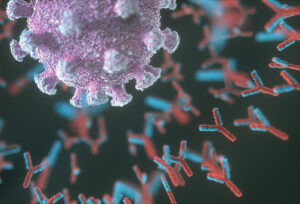Since December 2019, SARS-CoV-2 has infected over 46 million individuals worldwide leading to over 1 million deaths. While the majority of cases of COVID-19 have mild-to-moderate symptoms, the antibody responses in less severe infections are not well characterized. In order to gain a better understanding of the longevity and robustness of antibody responses in less severe cases of COVID-19, researchers in New York City screened 72,401 individuals with confirmed or suspected COVID-19 for SARS-CoV-2 antibodies. Over 30,030 individuals tested positive for SARS-CoV-2 antibodies with over 90% of individuals having moderate to high levels of anti-spike antibodies (>1:320 detected by ELISA). In 121 patients with COVID-19 followed over 5 months, the geometric mean titer of anti-spike antibodies declined from 764 to 404. Furthermore, levels of anti-spike antibodies correlated with neutralization antibodies (Spearman’s r=0.87, p<0.0001). Researchers plan to follow these individuals over a longer period of time to determine how stable SARS-CoV-2 antibodies are over time and whether they provide protection from re-infection. A better understanding of the longevity and kinetics of SARS-CoV-2 antibodies will also provide valuable information for understanding ideal donors of convalescent plasma and hyperimmune globulin.
Reference:

